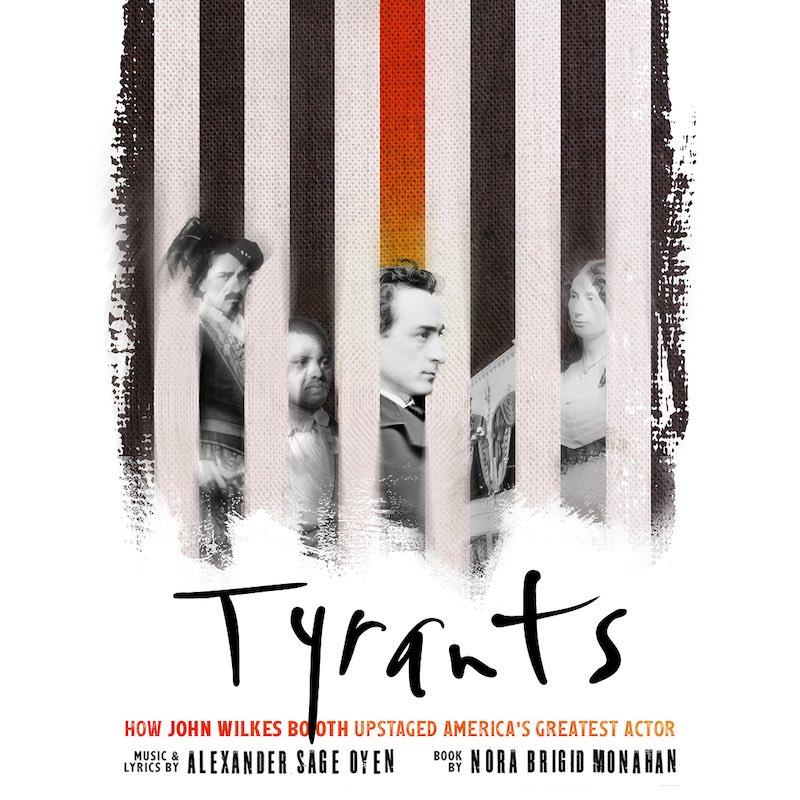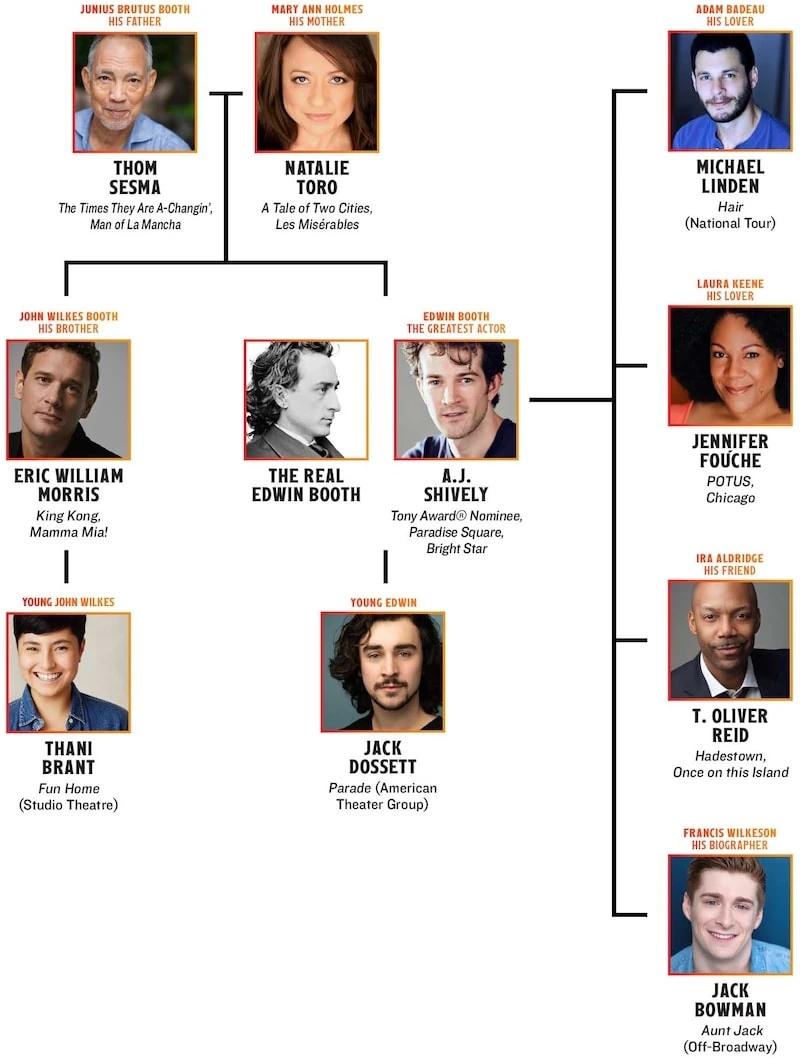John Wilkes Booth, the B-list actor and Confederacy fanboy who shot President Lincoln, is merely one of nine hit people featured in Sondheim’s musical Assassins. The limelight-hog would be pleased to know there’s now a musical that’s all about him!—well, him and his birth family actually, notably older brother Edwin Booth, said to be the greatest actor of his time (the one the Booth Theatre in New York is named after). We get to know a juicy lot about Edwin in the new tuner Tyrants, which debuted Friday and Saturday in a free concert presentation at the National Archives Building. As a “proof of concept” event, the evening served up an engrossing psychohistory of the Brothers Booth set to 21 appealing songs.
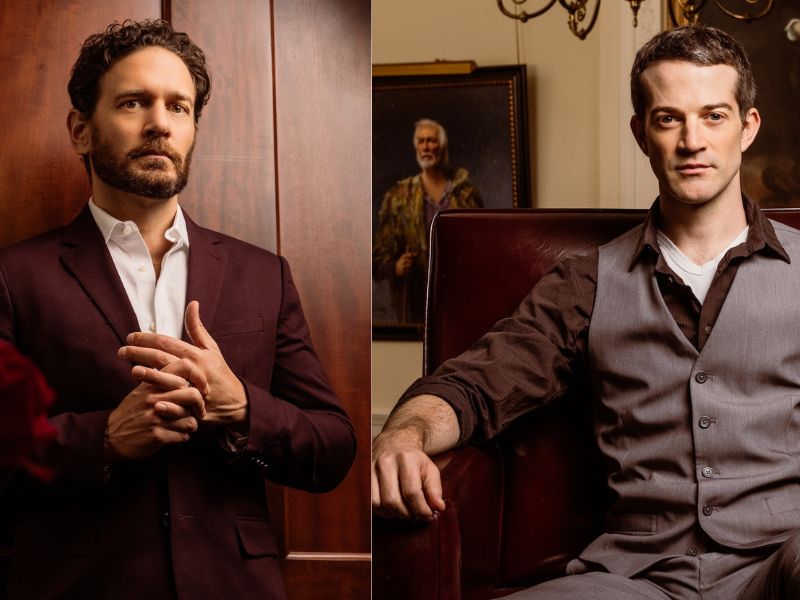
The very nonlinear show by Alexander Sage Owen (music and lyrics) and Nora Brigid Monahan (book) was ably directed by John Simpkins and performed by an accomplished cast of ten from behind music stands with four fine musicians off left. A timeline diagram on a screen behind them lit up to denote the date and location of each scene — an indispensable visual aid for keeping track of the multiple storylines as they jumped back and forth in time.
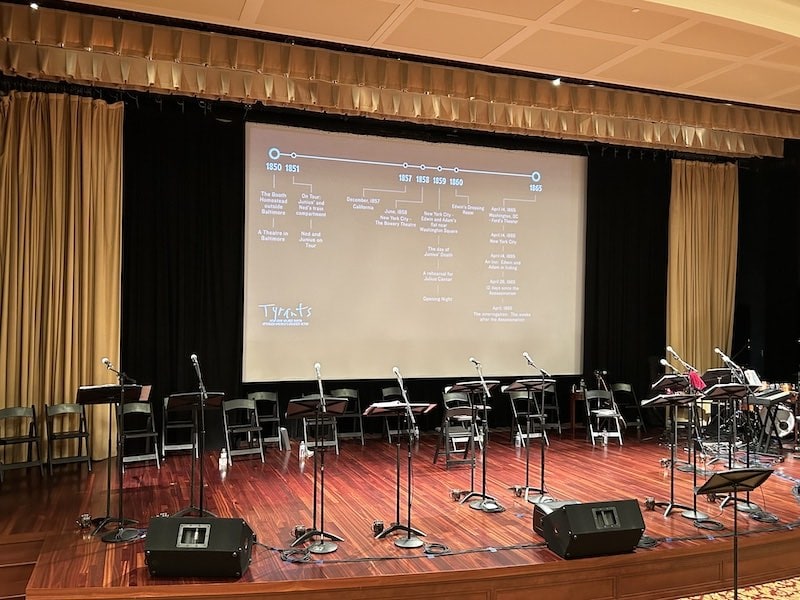
The title refers to what John Wilkes shouted after firing the fatal shot — Sic semper tyrannis! (“Thus always to tyrants”) — and also to the character of the brothers’ father, Junius Brutus Booth (played by Thom Sesma), an acclaimed Shakespearean actor in his own right and an obdurate inebriate. In an early song called “Like Father,” his sons explicitly call him a tyrant even as they long to replicate his talent and fame on stage: “One day I’ll be just like him. One day he’ll be proud of me.”
There’s a vivid episode in which John Wilkes purloins Junius Booth’s costume cloak and parades around in it in play with Edwin — and lies when his father demands to know who stole it. “You’re not a real actor,” Edwin then puts down John Wilkes. “You’re my page.”
In addition to the two sons’ trauma growing up in the shadow of their drunkard dad, the childhood rivalry between Edwin and John Wilkes — the younger’s jealousy of the older, the older’s lording it over the younger — becomes a through-line theme of both the brothers’ lives and the musical. We see their values collide, for instance, in a stunning scene in a theater dressing room when the elder brother Booth (A.J. Shively) wishes to introduce his younger brother (Eric William Morris) to his friend the great African American actor Ira Aldridge (T. Oliver Reid) — and John Wilkes, sputtering racist invective, refuses to shake Aldridge’s hand. Later, at the point when Edwin is told that his brother just shot the president, we see in Edwin an agony of recognition that in his mini tyranny over his kid brother, he may bear some responsibility for the crime.
The question of responsibility, it turns out, is writ large throughout. The end of Act One is in fact a song about it.
The cast includes two actors who play Edwin’s and John Wilkes’ younger selves (Jack Dossett and Thani Brant) — a device most interestingly deployed in an amusing parallel scene among all four in which one tries to teach the other iambic pentameter — while sibling tensions simmer.
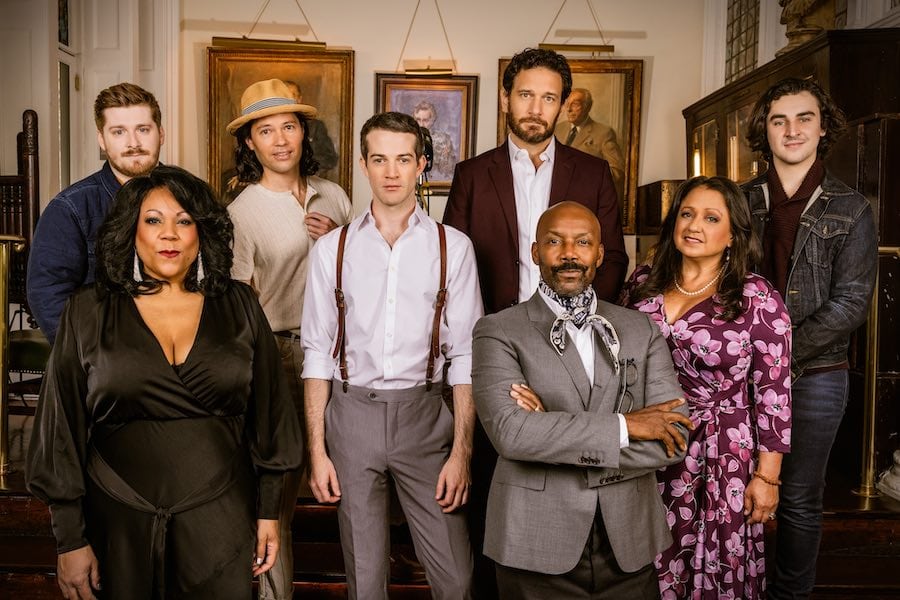
An intriguing aspect of the cast list is its inclusion of not only Ira Aldridge as Edwin’s friend but also a male theater critic as Edwin’s lover and a female theater manager/producer as Edwin’s lover too. We meet the critic first, Adam Badeau (Michael Linden), who writes for the New York Times and files such swooning, over-the-moon reviews of Edwin’s performances that the two end up living and bedding together (a career move for theater critics that had not occurred to me). The show is full of theater Easter eggs — tucked-in insiderisms — such as a song Adam sings called “Inside of a Moment” praising Edwin’s acting for being (acting-class alert:) “always in the middle of a moment.”
The theater manager/producer whom Edwin hooks up with is also a famed actress, Laura Keene — “Mrs. Keene,” she emphasizes, ”…but we’re estranged” — an impressive role in Jennifer Fouche’s powerhouse performance. Upon learning of Edwin’s and Laura’s tryst, Adam is miffed, so he splits, taking off to other parts and other roles that figure later in the story.
The background of John Wilkes’ and Edwin’s upbringing is threaded through the show, featuring not only their father, who dies on a bender, but also their long-suffering mother, Mary Ann Holmes, who bore ten children, nine of whom Edwin derogates in song as “The Nine Bastard Children of Booth.” Junius goes off on tour and drinks. “I need you to be my husband,” Mary Ann implores him, to no avail. Natalie Toro’s vocals as Mary Ann brought an indelible depth to the role.
A tenth character drops into the second act: Edwin’s biographer, Francis Wilkeson (Jack Bowman), who besides annotating the plot gets to sing a big summing-up number.
Both Edwin and his mother blame themselves in some measure for John Wilkes’ infamous act (a sentiment the musical seems to want to hold up for scrutiny), and Mary Ann is especially aggrieved that the feds will not return John Wilkes’ body to her for burial, retaining it as evidence. Edwin’s intervention effectively retrieves his brother’s corpse and — in a song A.J. Shively sings most movingly — grants him a modicum of self-forgiveness and clarity about responsibility.
The musical seems to want us to view the split between the Brothers Booth — the one who celebrated the Union’s Civil War victory, the other a racist enraged over Emancipation — as somehow reflective of or emblematic of our polarized nation, then and now. That might be a reach too far. Hard to gauge without a full production.
From where I sat at the concert version, the musical’s strength is actually the surprising relatability of the family, professional, and romantic mini-dramas it interweaves. ‘Tyrants’ lets us take in these emotive elements as backstory to the familiar assassination narrative now enshrined at Ford’s Theatre (where this show would fit nicely). Even killers have kin, after all.
Running Time: Two hours and 40 minutes including one 15-minute intermission.
Tyrants premiered on October 6 and 7, 2023, in a special concert presentation in the William G. McGowan Theater at the United States National Archives Building, 701 Constitution Avenue NW, Washington, DC. The evening was produced by Robert Bowman and Hundred Nights Hamlet LLC and hosted by The National Archives Foundation.
Song List
ACT ONE
1. Booth
2. Like Father
3. This Story
4. Inside of the Moment
5. The World Needs You
6. One Day Not Far Off
7. Within Your Reach
8. Son of the Jesters
9. Grief
10. The Greatest Actor
11. Enchanted Me
12. I Make Him Good
13. Responsibility
ACT TWO
14. The Nine Bastard Children of Booth
15. Turned Inside Out
16. Stardom
17. I Stole a Life
18. Grief (Reprise)
19. Act
20. Two Brothers
21. Finale
Tyrants
Music and Lyrics by Alexander Sage Oyen
Book by Nora Brigid Monahan
Directed by John Simpkins
A.J. Shively (Edwin Booth, the greatest actor)
Eric William Morris (John Wilkes Booth, Edwin’s brother)
Jennifer Fouché (Laura Keene, Edwin’s lover)
Michael Linden (Adam Badeau, Edwin’s lover)
T. Oliver Reid (Ira Aldridge, Edwin’s friend)
Natalie Toro (Mary Ann Holmes, the brothers’ mother)
Thom Sesma (Julius Brutus Booth, the brother’s father)
Thani Brant (Young John Wilkes)
Jack Dossett (Young Edwin)
Jack Bowman (Francis Wilkeson, Edwin’s biographer)
Cynthia Meng: Music Director/Bandleader/Keys
Jakob Reinhardt: Audio Engineer/Guitar
Sean Murphy: Bass
Derek Stoltenberg: Drums
Nathan Dame: Music Assistant/Copyist
Regina Averion: AI
David Lurie-Perret: Production Coordinator
Rachel Franco: Assistant Production Coordinator
Tommy Ranieri: Production Associate
Eric Emch: Artwork/Marketing Consultant
Eric Mann: Videographer
Brandon Fake: Video Editor
Evan Zimmerman: Photographer
Michael Hull: Photographer
The National Archives Foundation: Host
Robert Bowman: Producer
Allison Bressi: Executive Producer
Amy Sapp: Associate Producer
Jack Bowman: Assistant Producer
Steven Breiter: Line Producer


